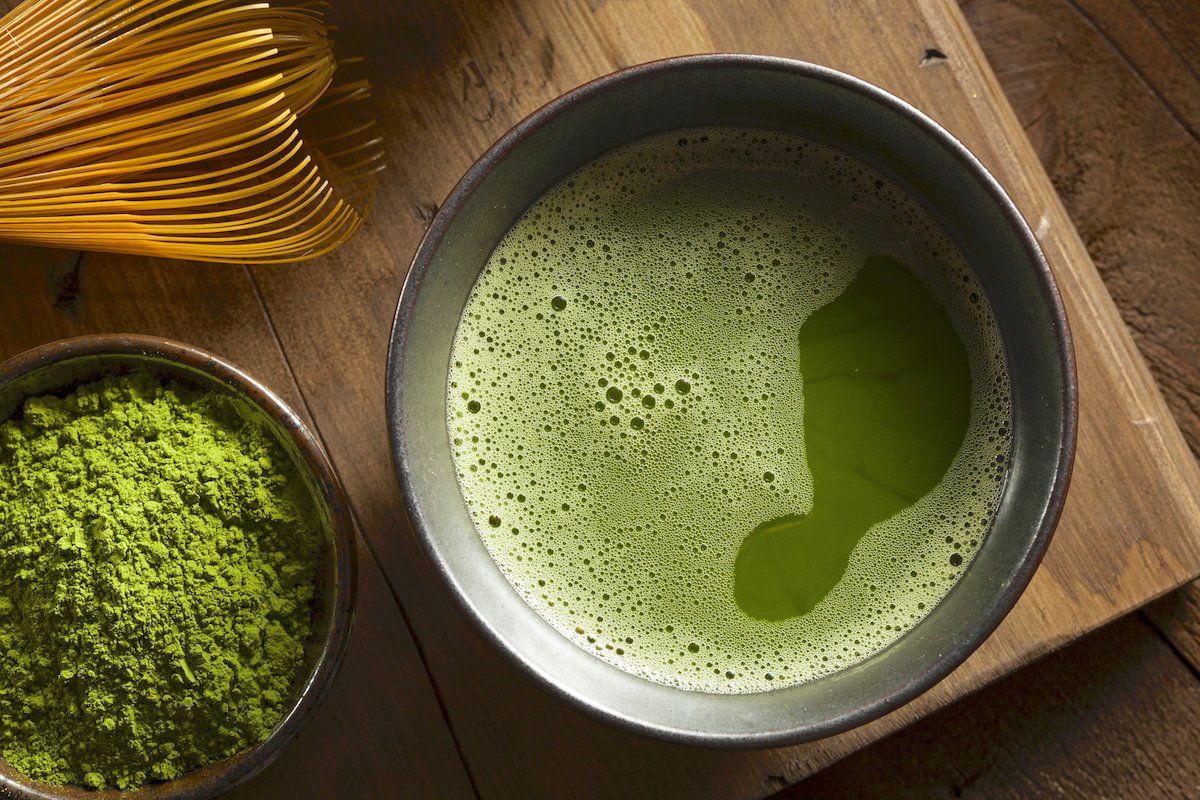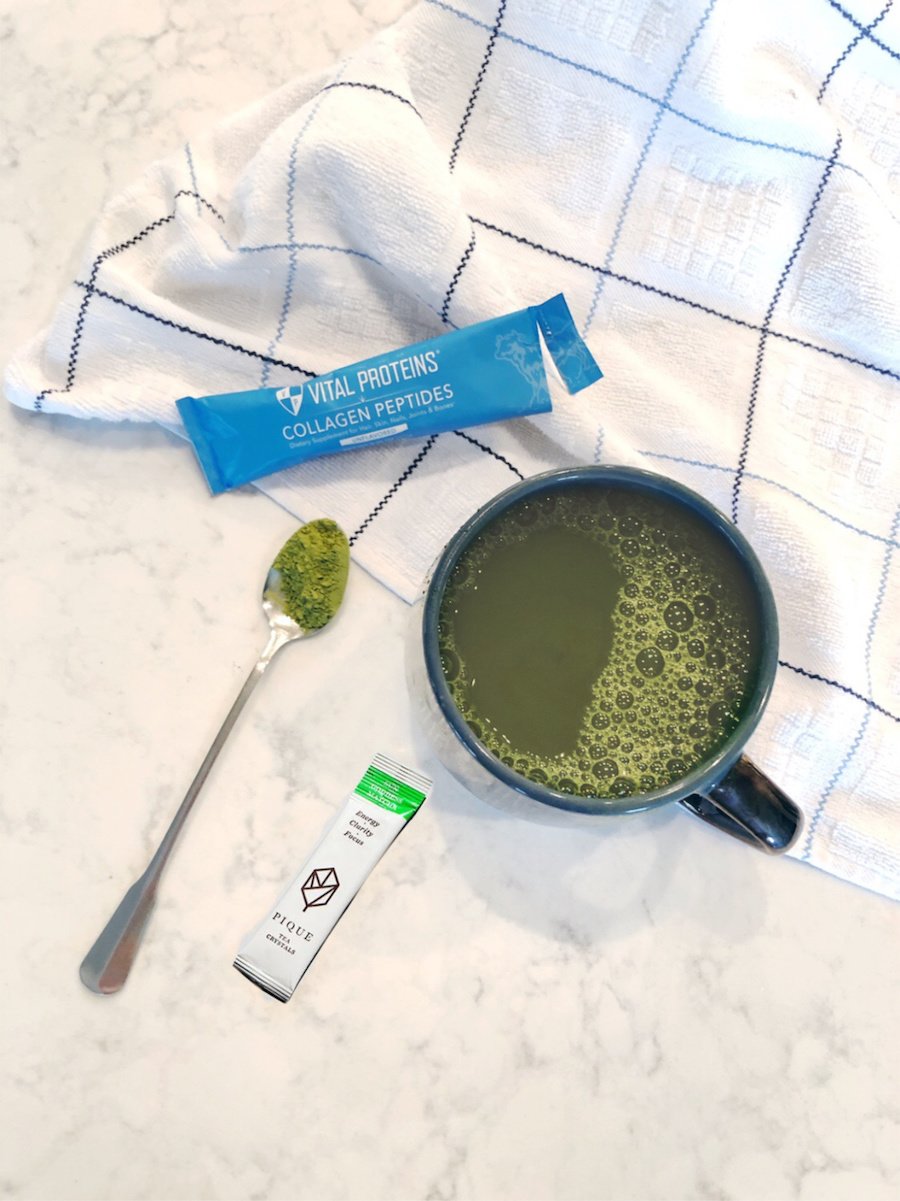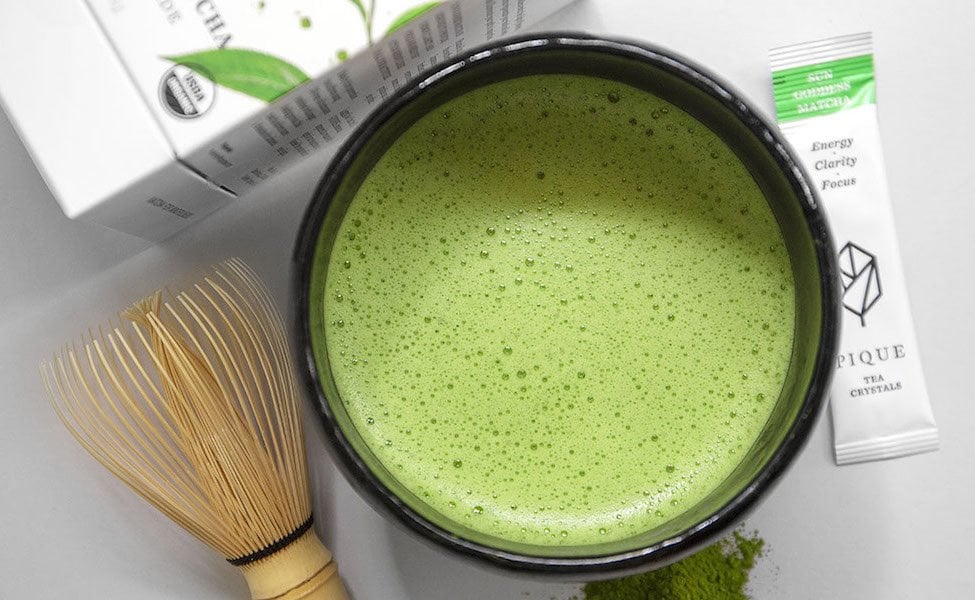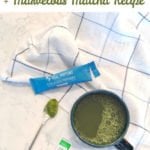The Health Benefits of Matcha Tea + Marvelous Matcha Drink Recipe
We’re sharing the many health benefits of matcha tea (boosts metabolism, helps detox the body, and aids in weight loss – to name a few) and our recipe for easing your taste buds into this supercharged nutritional drink.
What Is Matcha Tea?
Matcha tea, which means “powdered tea” is a particular type of green tea. Matcha is the only form of tea in which the whole leaf is consumed – and then only after a very specific growing process – preserving all the nutritional goodness in the leaves.
Matcha tea is grown entirely in the shade (farmers cover the leaves with heavy cloth) for three weeks before harvest – usually in May.
Growing the plants in shade causes the plants to produce thinner leaves with better flavor and increases the chlorophyll content. The plants are harvested completely by hand and only the youngest leaves are used for quality matcha.
After harvest, the leaves are steamed to stop fermentation, dried, and packed into bales for cold storage for six months. The aging gives the tea better flavor.
The Health Benefits of Matcha Tea
Matcha tea provides trace minerals and vitamins, specifically Vitamins A, B-complex, C, E, and K.
However, the big nutritional boost in matcha comes from its catechin polyphenol content. The most important of these polyphenols is EGCG (epigallo-catechin gallate). The interest in EGCG for its potential health benefits by the scientific community has exploded and countless studies of its benefits are currently underway.
Catechin polyphenols are compounds loaded with antioxidants. These antioxidants and other beneficial parts of matcha green tea leaves have been found to:
- Protect against several types of cancer by decreasing the growth of cancer cells
- Help prevent cardiovascular issues and heart disease (reduction of cholesterol in the blood and reduce high blood pressure)
- Support and boost the immune system
- May help slow the aging process
- Help the body resist toxins
- Boost metabolism
- Improve brain function
- Boost energy levels with a more sustained balance than coffee, soda, or energy drinks which often cause a crash
- Help stabilize blood sugar levels and insulin levels in people with Type 2 diabetes
- Support a healthy oral microbiome
- Neutralize free radicals
- Improve complexion (try a matcha facial mask for extra benefits)
- May lower LDL cholesterol
- Help the body detox
- Reduce inflammation – helping with arthritis, autoimmune issues, lung problems, and even mental health
Matcha is a wonderful tea to use in ceremony or as part of a ritual. The Japanese Tea Ceremony is a wonderful example of spiritual lessons embodied in ritual.
More About Matcha Tea for Weight Loss
An American Journal of Clinical Nutrition study compared the effects of drinking one bottle of oolong tea containing 690 milligrams of catechins versus drinking one bottle containing 22 milligrams of catechins.
In the study, 35 healthy Japanese men with similar BMI and waist circumference distributions were divided into two groups. The researchers gave one group the 690 milligrams of tea and the other group the 22 milligrams of tea.
After 12 weeks, they observed that body fat mass, BMI, body weight, subcutaneous fat area and waist circumference were all “significantly lower” in the 690-milligram catechin group than in the 22-milligram group.
Additionally, the modifications in LDL levels due to the dramatic decreases in body fat mass and total fat area were notable. From these results, researchers confidently concluded that because drinking tea – specifically matcha tea – containing 690 milligrams of catechins for 12 weeks reduced body fat, consuming catechins could aid in the prevention and improvement of many diseases — especially obesity.
We’d love to see a study on matcha for weight loss in women, by the way!
Does Matcha Have As Much Caffeine As Coffee?
Matcha naturally contains caffeine. Regular green tea contains about 28 milligrams of caffeine per eight-ounce cup. Matcha contains more because you actually drink the tea leaves.
What about the caffeine in matcha compared to coffee? The answer is no, matcha doesn’t contain as much caffeine as your average cup of coffee. Matcha typically contains 19 to 44 mg of caffeine per gram. So depending on the strength of the brew, an average cup of matcha can contain anywhere from 25 to 130 fewer grams of caffeine.
The good news is – you’re less likely to experience the caffeine crash with match. It contains an amino acid called L-theanine, which helps your body absorb the caffeine slowly.
Pique’s Matcha tea plants are shaded up to 35% longer than other leaves, which creates a higher level of L-theanine, a natural mood calmer. If you’ve heard Dr. Andrew Weil talk about matcha tea, you’ll know this is the calming effect ingredient he says will give you focused energy – much better than the caffeine found in coffee!
L-theanine helps to naturally:
– Boost levels of Gamma-aminobutyric acid (GABA) and other brain-relaxing chemicals, which can help regulate emotions, mood, and sleep.
– Enhance alpha brain waves, which lead to better alertness and creativity. Monks have been known to drink matcha to help stay focused during long hours of meditation.
– Lower levels of excitatory brain chemicals, which can help reduce stress and anxiety.
What To Know Before You Buy Matcha Tea
Matcha tea is a top trend right now. And when a food gets popular, that can lead to less than pure forms getting into the market.
Matcha tea comes from Japan and many of the tea farms are usually close together. That means that while one farm may be very cautious with its growing procedures, one a little farther down the road may not be.
When the wind blows, pesticides from the not so good farm may end up in the soil at the good farm. Add to this issue, the problem of radioactive exposure from Fukushima and, well, you get the picture.
Another thing to understand before you buy is that matcha tea is expensive.
Quality matcha green tea powder is a premium product. Because of the way leaves are grown, shaded, harvested and processed, the quality of the matcha will be reflected in the price. A high quality matcha can only be harvested once a year! So if you find matcha for cheap, it’s probably because the leaves are of a lesser quality and weren’t properly processed – which means far fewer health benefits.
One we’re particularly impressed with is Pique Tea’s Sun Goddess Matcha. Pique’s teas are made from supercharged 100% organic tea crystals that dissolve in cold and hot water. Why do we love tea crystals? There’s no need to worry about brewing with tea bags that contain plastic.
Pique’s Sun Goddess Matcha is the world’s PUREST Ceremonial matcha. It is the FIRST matcha to Quadruple Toxin Screen for:
Heavy Metals
Fluoride
Pesticides
Toxic Mold
Radioactive Isotopes
Pique’s tea crystals deliver 12x the antioxidants of teabags and 20x the antioxidants of bottled tea with no preservatives, sugar or additives. They triple screen their products for pesticides, heavy metals and mold.
After years of looking for a good source for matcha tea, Pique Tea found a farm in Kagoshima that neighbors Okinawa, which is known for the longevity of its people (source).
Ways to Enjoy Matcha Tea
For many people, matcha is an acquired taste. Both the smell and taste are rich and earthy. Because it’s high in vitamin C, chlorophyll, selenium, chromium, zinc, and magnesium… plus all the other benefits, it’s a taste we’ve deemed worthy of acquiring.
Best Whisk or Frother for Matcha
I use a bamboo matcha tea whisk because it works well and feels more ceremonial, but it’s not a deal breaker if you don’t have one. You can use a regular whisk, a handheld milk frother, or if your bowl is large enough, use a regular spoon and stir vigorously.
Traditional Japanese cultures use the following tools to prepare matcha green tea drinks:
- Matcha Tea Scoop (Chashaku)
- Fine Mesh Tea Strainer
- Matcha Bowl (Chawan)
- Matcha Bamboo Whisk (Chasen)
You can also find matcha tea starter set which makes buying all of the tools a bit more affordable.
Matcha Drink Recipe
You can enjoy matcha as a simple tea. Or you can make it into a hot or cold matcha latte.
This recipe cuts the strong and what some consider a bitter taste with a little local honey. And because we are always looking for ways to get the benefits of collagen peptides, we add it to all of our warm drinks. Vital Proteins Collagen Peptides has very little flavor, so it doesn’t compete with the rich flavor of this matcha drink recipe.
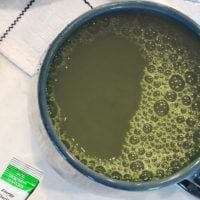
Marvelous Matcha Tea
Ingredients
- 1 tablespoon matcha powder organic
- 1 cup water boiling
- 1 teaspoon honey local
- 1 tablespoon collagen powder optional
Instructions
- In a ceremonial or small glass bowl, combine matcha with hot water and whisk (or stir) until matcha has dissolved.
- Pour into teacup or mug.
- Stir in honey and optional collagen and enjoy hot.
Nutrition
Let us know if matcha becomes your favorite new cup of tea!

